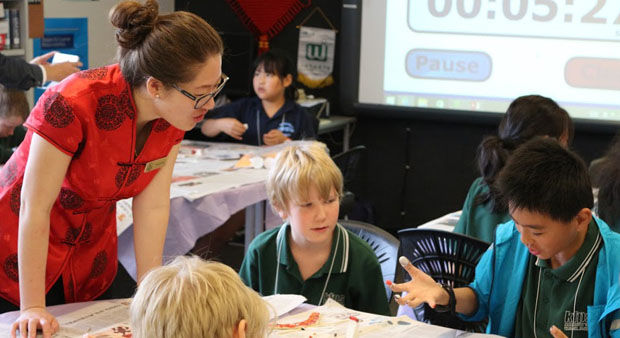'Disappointing': Victorian schools cry foul over international student freeze
- Kawala Xie
- May 9, 2019
- 4 min read

A freeze on international students at state schools imposed by the Victorian government could have "damaging" consequences, according to an association of principals.
The Victorian Association of State Secondary Principals and a Bendigo school have criticised a government-imposed freeze on international students, which was announced on April 30.
In a first, the Victorian government announced that state schools would need to put a halt to receiving international students in 2019 because the program is at capacity.
The annual cap of 5,750 international student enrolment in primary and secondary public schools is set by the Victorian Registration and Qualifications Authority (VRQA), the state’s training and education regulator.

Education Minister James Merlino made the announcement
Some schools have had to defer overseas students who were planning to enrol later in 2019, a move that could affect the reputation of some schools, according to Victorian Association of State Secondary Principals (VASSP) President Sue Bell.
She told SBS Cantonese principals were not happy about having to turn down potential students.
“They don’t want their reputation to be damaged. They don’t want people to think that Victorian education is full. [They'll be told] 'You can’t come here', and then have them turn around and go somewhere else,” Ms Bell said.
Ms Bell said she was meeting principals across the state and seeking suggestions for the state education department in order to better manage international student enrolments.
Some of the schools affected by the freeze went on a recruitment tour to China and Vietnam with the state education department’s International Education Division (IED) in March; about 10 schools were in the recruitment group.
Bendigo Senior Secondary College (BSSC) was on the trip, where they recruited two Chinese students who are planning to enrol later this year. Due to the cap, the students have been told to seek alternative arrangements for planning their studies in Australia, either to delay their travels until the official enrolment in Term 1 next year or to take intensive language courses with private education agencies in Melbourne as a transition, according to Juncai Lin, the international student coordinator at BSSC.

Students communicating in BSSC’s “Confucius Classroom,” a signature program the school co-hosts with Chinese government organization for local students.
Mr Lin said the students' families had not yet sorted out their plans, but he believed their parents would have wished to send their kids to the school directly, instead of having to wait and seeking other options.
BSSC currently had 17 international students enrolled and the majority of them were Chinese. Given the capacity to accommodate more international students, the enrolment cap does not come as a piece of good news for the school.
“We would love to grow our program a little bit,” Mr Lin said. “It’s disappointing that we can’t do that due to the cap.” But he understands the state’s decision for imposing the cap.
The cap, which applies to students with the subclass 500 visa, is to ensure international students can receive a high-quality education and welfare services, according to the Victorian state education department.
Fee-paying international students including all visa subclass holders account for about 0.94 per cent in the total enrollment of students in Victorian government schools, according to the state’s education department data.
Victorian Minister for Education James Merlino reaffirmed in a statement to SBS Cantonese that he has sought “urgent advice” to ensure more international students can be enrolled in Victorian schools in future.
“We are a product of our own success. This is a testament to the quality of our schools and the growing strength of Victoria's education reputation abroad,” he said.
The Victorian state education department said the cap only applies to new international enrolment in the rest of 2019 and has no effect on current and enrolments in the following year or beyond.
Temporary and permanent residents or citizens of Australia are not affected.
'Fundamental way of learning'
International education expert Christopher Ziguras of RMIT University said international student enrolment statewide has increased about 10 to 20 per cent annually over the past five years.
“The fact that the number is increasing is not surprising, what surprises me is the department [Victoria’s State Department of Education and Training] wasn’t proactive in tracking enrolment number against this cap.”
Professor Ziguras said the cap was not very effective to limit less than 1 per cent of international student enrolment.
“It makes much more sense to have caps or guidelines about student mix within individual schools,” he said.
“Clearly you would want to make sure these schools can manage its international student numbers adequately with the resources they have.”
Victoria is home to international students from over 170 countries, with most of them coming from Asia.
As the federal election is around the corner, the Labor government has issued the new Future Asia Plan last week, aiming to deepen engagement with Asian countries if elected. Part of the plan focuses on education, which Labor vows to boost learning about Asia and improve Asian languages and literacy in Australian schools.
Professor Ziguras welcomes the Labor move, though Australian schools have been investing a lot in Asian literacy already. He said learning from Asian students was a good way for local students to enhance their knowledge about Asia.
“These young people are learning from each other, through friendships and travel with each other, learning about their classmates’ cultures. That’s a very fundamental way of learning."
READ FULL STORY ON SBS CANTONESE:
https://www.sbs.com.au/yourlanguage/cantonese/en/article/2019/05/10/disappointing-victorian-schools-cry-foul-over-international-student-freeze























Comments